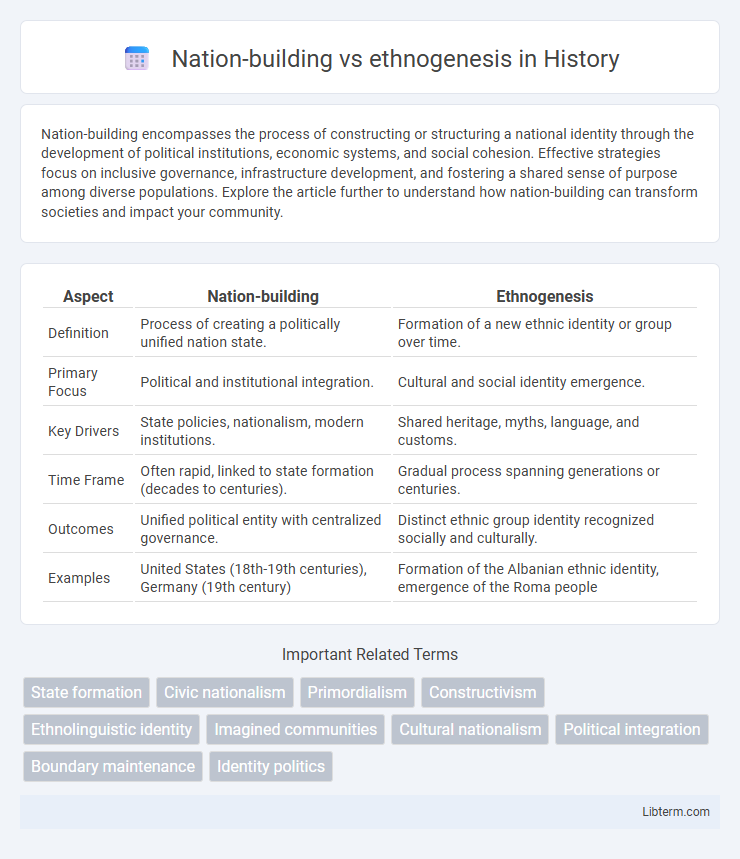Nation-building encompasses the process of constructing or structuring a national identity through the development of political institutions, economic systems, and social cohesion. Effective strategies focus on inclusive governance, infrastructure development, and fostering a shared sense of purpose among diverse populations. Explore the article further to understand how nation-building can transform societies and impact your community.
Table of Comparison
| Aspect | Nation-building | Ethnogenesis |
|---|---|---|
| Definition | Process of creating a politically unified nation state. | Formation of a new ethnic identity or group over time. |
| Primary Focus | Political and institutional integration. | Cultural and social identity emergence. |
| Key Drivers | State policies, nationalism, modern institutions. | Shared heritage, myths, language, and customs. |
| Time Frame | Often rapid, linked to state formation (decades to centuries). | Gradual process spanning generations or centuries. |
| Outcomes | Unified political entity with centralized governance. | Distinct ethnic group identity recognized socially and culturally. |
| Examples | United States (18th-19th centuries), Germany (19th century) | Formation of the Albanian ethnic identity, emergence of the Roma people |
Defining Nation-Building and Ethnogenesis
Nation-building refers to the process of constructing or structuring a national identity using political, social, and economic frameworks to unify diverse populations within defined borders. Ethnogenesis is the emergence and formation of an ethnic group through shared ancestry, culture, language, and historical experience, often evolving over centuries. While nation-building emphasizes state-centric identity creation, ethnogenesis centers on the organic development of ethnic identities rooted in collective memory and cultural practices.
Historical Roots of Nation-Building
Nation-building historically emerges from the consolidation of diverse ethnic groups under a unified political structure, often driven by shared language, culture, and collective memory. Ethnogenesis refers to the formation and development of distinct ethnic identities, which predates and influences the processes of nation-building by shaping group cohesion and social boundaries. The historical roots of nation-building are deeply intertwined with ethnogenesis, as early ethnic communities laid the groundwork for modern national identities through migration, conflict, and cultural amalgamation.
The Process of Ethnogenesis Explained
Ethnogenesis is the process through which distinct ethnic groups form by developing shared cultural traits, language, and collective identity over time. This occurs through migration, intermarriage, social interaction, and adaptation to environmental or political changes, often resulting in new social structures and traditions. Unlike nation-building, which involves the creation of political entities and national identity, ethnogenesis emphasizes the organic emergence of ethnic groups from complex historical and social dynamics.
Key Differences Between Nation-Building and Ethnogenesis
Nation-building involves deliberate state-led efforts to create a unified national identity encompassing diverse cultural groups, often through political institutions, laws, and education systems, whereas ethnogenesis refers to the natural or historical process by which a distinct ethnic group emerges over time due to shared ancestry, language, or cultural practices. Nation-building emphasizes constructing civic nationalism and forging a collective identity for political cohesion, while ethnogenesis centers on the organic development of ethnic identity rooted in common heritage and social bonds. The temporal scope also differs, with nation-building typically occurring within modern state formation periods, while ethnogenesis can span centuries, reflecting long-term cultural evolution.
The Role of Identity in Nation-Building
Identity serves as the foundational element in nation-building, where shared symbols, language, and collective memory unify diverse groups into a cohesive political entity. Ethnogenesis, by contrast, emphasizes the emergence and consolidation of distinct ethnic identities over time, often predating formal state structures. The interplay between constructed national identity and ethnic origins shapes the political legitimacy and social cohesion essential for nation-building processes.
Cultural Drivers of Ethnogenesis
Ethnogenesis is primarily driven by shared cultural practices, language, religion, and collective memory that create a distinct group identity over time. Nation-building involves political and institutional efforts to unify diverse populations into a cohesive state, often emphasizing inclusive national symbols and narratives. Cultural drivers of ethnogenesis include rituals, myths, and traditions that foster a sense of belonging and differentiate the group from others.
Political Implications of Nation-Building
Nation-building involves the deliberate political process of uniting diverse groups within a state to create a cohesive national identity, often through policies that promote shared symbols, language, and institutions. This process can lead to state consolidation, enhanced political stability, and increased legitimacy for governing authorities while sometimes marginalizing ethnic minorities, fueling tensions and resistance. The political implications of nation-building include the redefinition of citizenship, centralization of power, and potential conflicts arising from balancing inclusive governance with dominant group interests.
Case Studies: Successful Ethnogenesis
Successful ethnogenesis is exemplified by the emergence of the Kurds, whose shared language, culture, and political struggles solidified a collective identity distinct from neighboring groups. Similarly, the Maori of New Zealand experienced ethnogenesis through revitalization of traditional customs, language preservation, and legal recognition, fostering national cohesion. These cases highlight how ethnogenesis relies on cultural revival and political mobilization rather than solely on state-driven nation-building processes.
Challenges in Modern Nation-Building
Modern nation-building faces challenges such as managing ethnic diversity, mitigating sectarian conflicts, and integrating marginalized groups into political frameworks. Balancing national identity construction with the preservation of distinct ethnic cultures often leads to tensions in multi-ethnic states. State institutions must navigate competing loyalties and historical grievances while promoting inclusive governance to achieve social cohesion and political stability.
Nation-Building and Ethnogenesis in a Globalized World
Nation-building involves the deliberate process by which state institutions foster social cohesion, national identity, and political unity among diverse populations, often leveraging shared symbols and narratives. Ethnogenesis refers to the formation and evolution of distinct ethnic groups over time through cultural, linguistic, and historical developments, frequently shaped by social interactions and collective memory. In a globalized world, transnational migration, digital communication, and multicultural exchanges accelerate both nation-building efforts and ethnogenesis by reshaping identities and prompting inclusive or contested definitions of belonging.
Nation-building Infographic

 libterm.com
libterm.com